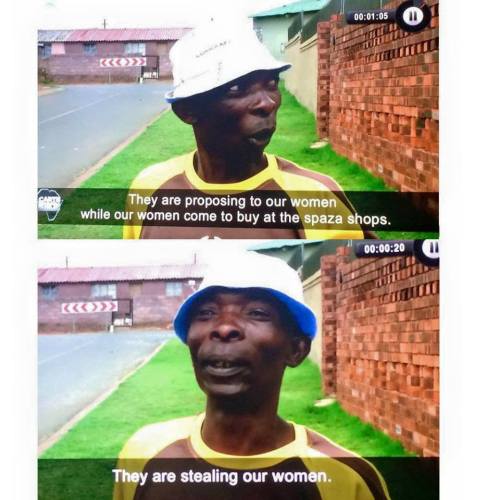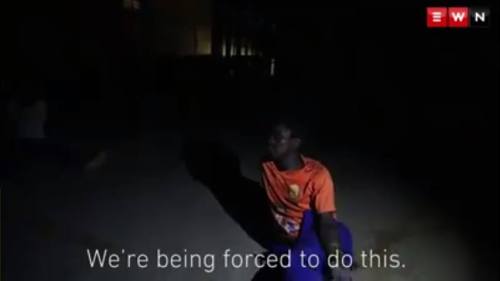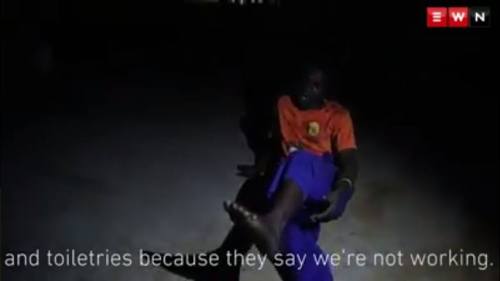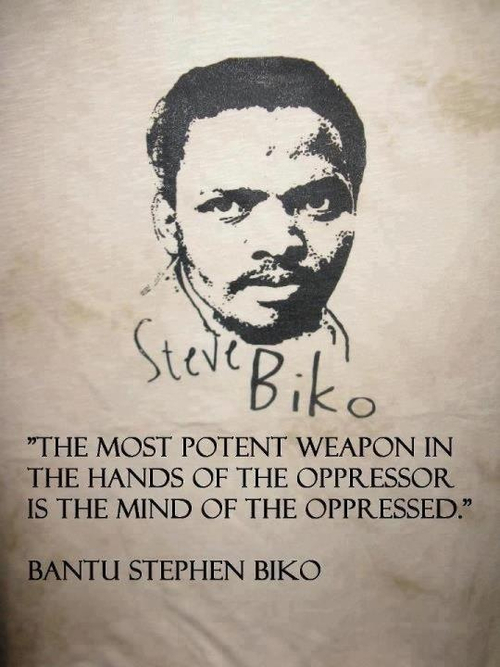In William Shakespeare’s lyrical tale of “star-crosse’d” lovers, the legendary playwright penned four immortal lines that embody a struggle and tragedy that still plagues mankind to this day. In those lines, Juliet tells Romeo:
“What’s in a name? That
which we call a rose
By any other name would
smell as sweet.”
Her point was that a name is an artificial and meaningless convention because she was in love with the person who happened to carry the Montague name but not the name “Montague” nor the family.
Looking at what is happening in South Africa, we can reach the same conclusion in describing the absurdity of those in power who tried to spin the xenophobia which resulted in the deaths of numerous “foreigners” by calling it by another misnomer, namely Afrophobia.
We could rewrite Shakespeare’s immortal quote, trying to make sense of this crime against humanity:
“What’s in a name? That
which we call Afrophobia
By any other name would
still be inhumane.”
The point is clear: whether or not we call the xenophobic attacks Afrophobia, the outcome is still the same. They are senseless murders.
Numerous people died. Many more were displaced. Businesses were destroyed. Properties looted. People are living in fear. People were horrified. Disgusted.

A man is held in Jeppestown by the police in Johannesburg for allegedly attacking foreigners in the xenophobic attacks last month and looting businesses owned by foreigners.
The nation is severely divided. Relations between nations are tense. Tempers are flaring across borders and social media. The forecast is not looking good for Africa.
From the north to the south, the east to the west, Africa is in trouble. We are in trouble. Rarely has one incident, maybe with the exception of Boko Haram, set so many people in Africa against each other, or united them to condemn such depravity.
Yet international condemnation was absent in the furore engulfing Africa at the time. The mainstream [western] media barely uttered a word for over a week or two. When it finally did, many social commentators argued it was too little too late.
They argued that if the attacks had targeted white foreigners, they would have reacted sooner condemning the attacks in the strongest terms. Maybe there is some truth to that.
If that was the case, President Jacob Zuma would have reacted swiftly and firmly to avoid a situation where NATO countries would venture to put boots on the ground to protect their citizens as what happened during the Crisis in the Congo during the reign of Patrice Lumumba, and in Egypt under the watch of Gamal Abdel Nasser at the time of the Suez Canal Crisis. No African president wants a situation like that.
![Residents from Jeppestown hostels flee for cover when the police fire rubber bullets to disperse the unruly rioters who were attacking people and destroying and looting business, local and foreign owned. [Picture source: Ihsaan Haffejee – Al Jazeera]](https://thegatvolblogger.files.wordpress.com/2015/05/wp_ss_20150514_0012-e1432739663775.png?w=500)
Residents from Jeppestown hostels flee for cover when the police fire rubber bullets to disperse the unruly rioters who were attacking people and destroying and looting business, local and foreign owned.
[Picture source: Ihsaan Haffejee – Al Jazeera]
Not many were convinced the white media placed equal value on black lives as it did on white lives. Their coverage of issues in Africa or their bias in their reporting of the murder of black men and women in America and many other countries has led many to question their motives.
Whether or not we call these xenophobic attacks Afrophobia, it does not mask the horror; the depravity, the inhumane, or the shocking reality of this callous snuffing out of human life.
It goes against the moral and humane tenets of what we call Ubuntu [Zulu], Hunhu [Shona], Umntu [Xhosa – South Africa], Botho in Sesotho and Setswana [Botswana], Numunhu [Shangaan], Vhuthu [Venda], Bunhu [Tsonga], Utu in Kiswahili/ Swahili [Kenya and Tanzania], Ajobi [Yoruba – Nigeria], Abantu in [Luganda] Uganda and many other names across East, West and Southern Africa.
These humane tenets of Ubuntu, Hunhu is the common thread that runs throughout all the different ethnic groups of East, West and Southern Africa.
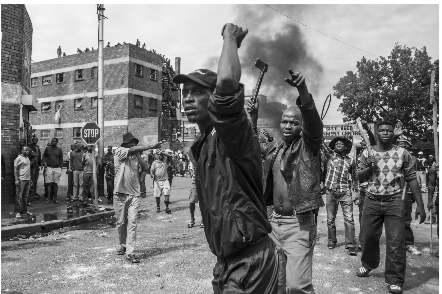
The men from Jeppestown hostels making gestures and brandishing various weapons to threaten foreign-owned businesses in their local neighbourhood. [Picture source: Ihsaan Haffejee – Al Jazeera]
It’s testimony that we, Africans, spring from the same source and we have more in common than we have in differences.
The Zulu saying, “Umuntu ngumuntu ngabantu”: a person is a person because of people encapsulates this thinking. We can break it down further into Sotho and Tsonga:
Motho ke motho ka batho (Sotho)
Munhu i munhu hi van’wana vanhu (Tsonga)
The meanings are the same as the Zulu saying above. As we can see clearly, our African worldview or philosophy holds true that we are only human because of other human beings; therefore, when we dehumanise others, we are dehumanised as a result.
Archbishop Desmond Tutu tried to explain the concept of Ubuntu. He said,
Ubuntu is very difficult to render into a Western language. When we want to give high praise to someone we say, “Yu unobuntu”; “Hey, so-and-so has ubuntu.” Then you are generous, you are hospitable, you are friendly and caring and compassionate. You share what you have.
Archbishop Desmond Mpilo Tutu

A group of NIgerian men attempt to salvage a car from their vehicle repair shop which was burnt down by mobs. The entire workshop was razed and all its contents, other cars, destroyed. The police keep watch over them.
[Picture source: Ihsaan Haffejee – Al Jazeera]
All these nations such as South Africa, Zimbabwe, Mozambique, Malawi, Nigeria, etc. are white constructs.
Africa never had these artificial borders on a map until the colonialists cut up the continent to build their personal fiefdoms.
Prior to that, we, Africans could move freely within our continent in search of food, greener pastures, water, etc. without restrictions as we have today.
It was through these migrations that we intermarried, traded material goods and ideas and acquired new skills that enriched our various ethnic groups.
However, the borders we have today hinder trade within the continent. They prevent the easy exchange of ideas, cultural and economical capital and exchange of human resources.
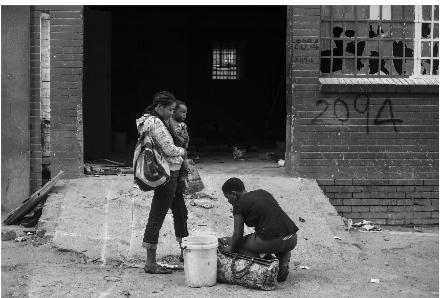
A family packs their belongings and flee from Jeppestown after receiving death threats by angry mobs.
[Picture source: Ihsaan Haffejee – Al Jazeera]
The division perpetuates a continual state of arrested development which prevents us from realising our potential as a continent.
The Europeans are constantly calling for continental unity: they realise that a united Europe is stronger in the political, economical, military and cultural spheres.
Yet we, Africans, still refuse to see that our safety and security, progress and strength lies within our ability to unite as a continent.
It seems that the tactics of divide and rule first used by the Romans and later adapted by the Europeans are still as effective today as they were back then in breaking our forward stride.
As long as we are fighting for these small nations we inherited instead of knocking down these imperial borders, the greater vision of the United Africa Kwame Nkrumah, Marcus Garvey, Bob Marley and others called for will always remain a fleeting illusion.
Some Africans pride themselves about their ability to think outside the box. Ironically, this idea is a cliché, therefore, it can only produce clichéd thinking.
Furthermore, it is nothing but an illusion because those very people can’t think outside the borders set up through the colonisation of the continent, nor outside the confines of their intellectual sandboxes.
We need to stop thinking nationally but develop a continental perspective because the future for Africa lies within the confines of the motherland. No nation is an island.
Our inability to think beyond these border posts the colonialists set up for us is sheepish behaviour. It prevents us from manning up and dealing with the root causes of our poverty and oppression.
It is the reason why many other races and people treat Africans like little boys and girls who constantly need guidance because we can’t do things for ourselves and improve our lot.
Our minds have been twisted to respect flags: useless pieces of cloth coloured and designed by man but which have no value whatsoever.
We have flag flying independence but no economic independence which means the very idea of independence is an illusion.
We remain dependent on whoever is pulling the purse strings. They are the ones pulling the puppet strings of those caricatures of human brings we call African leaders.
Instead of addressing the question of economic independence, we forsake the greater humane good in deference to these useless pieces of cloths that we pledge to die for, yet we wouldn’t die in the quest for humanity, or fighting the forces that seek to keep us politically and economically subservient.
We wouldn’t die for our brothers or sisters but we would die for a useless piece of cloth. This illustrates the problems with the things that we value.
The United Nations Universal Declaration of Human Rights
Afrophobia or xenophobia is a violation of the United Nations Universal Declaration of Human Rights. It is a violation of the right to life. It is a violation of the right to protection. Afrophobia or xenophobia violate almost all the rights that should be accorded to every human being.
We should never let it spread its ugly roots in our communities. It is a poison that kills and tears apart the delicate fabric of society.
Afrophobia or xenophobia is murder with an abstract name to divert attention from what is really going on in South Africa. It is murder with a different dress on.

P An armed policemen in Johannesburg checks out the remains of a car sales shop where rows of cars lie under dust and soot after the business owned by a Nigerian was burnt down by some local South Africans during last month’s xenophobic madness.
Afrophobia or xenophobia is unAfrican
Afrophobia or xenophobia is an ugly thing: it is unAfrican. It is unAfrican for hosts to mistreat visitors.
It goes against the tenets of Ubuntu, Hunhu, Umntu, Utu, Ajobi, Vhutu, Bunhu, Abantu, etc. most of us were taught to adhere to from an early age.
We were taught to welcome and accommodate strangers. We were taught to offer food and water to visitors who visited us. Failure to observe these customs were frowned upon by our elders.
It was a sure way to earn a chastisement and it was always condemned as a sign of ill breeding as it reflected poorly on ones upbringing. It reflected poorly on ones parents or guardians if one failed to observe these customs.
A person who displayed values such as compassion, empathy, respect or morals was often described as munhu ane hunhu: a person imbued with humaneness.
Anyone who lacked these ethics or morals was seen as a person asina hunhu or haana hunhu, a person lacking humaneness. They were not ashamed of behaving badly, robbing, disrespecting elders, cheating, lying, raping, stealing, killing, etc.
Ubuntu, Hunhu, is what makes us munhu ane hunhu or vanhu vane hunhu: good humane people.
It is a shame that those in the know tried to repackage murder and crimes under a more acceptable and palatable label. That is a shame because Ubuntu condemns corruption of any kind.
They seem to have abdicated their African culture for a caricature of a hybrid culture that is undistinguishable. It seems like they lost their humaneness.
Ubuntu/ Hunhu is the core of the African conception of humanism. A person who embodies this concept of humanism is said to be a good human being who understands propriety; they are morally upright.
They’re responsible, honest, just, trustworthy, hard working, full of integrity, possess a cooperative spirit and can stand in solidarity with others.
They are hospitable and devoted to the well-being of the family and the wider community. In a nutshell, anyone with Ubuntu/ Hunhu understands how to uphold the norms and values of the family, the community and society.
Therefore, they would never commit the horrific acts we witnessed because life in African culture is sacred.
Those who fall short are often rebuked In Shona or Ndebele [Zimbabwe] as “Hausi hunhu ihwohwo/ Ayisibobuntu lobu” (This is not humanness).
These type of people are viewed as ruffians or scoundrels because of their lack of a moral compass that shows humaneness.
In African tradition or culture, murder is not encouraged. It is a harbinger of ngozi, a curse, because it causes avenging spirits to wipe out generations and cause bad luck until the deceased is appeased.
Pre-colonisation, when a person took a person’s life, they had to atone for their transgression by compensating the family of the deceased; not only to compensate the family materially, but to appease the dead to allow them to rest in peace.
In some cases, the perpetrator or his family were ordered to hand over a member of their family, normally a young girl – a virgin, to the family of the deceased. This was accompanied by rituals that had to be performed but I won’t get into the details here. That is a topic for another day.
However, it illustrates the sanctity Africans had for the living. It was sacrilegious to take a life because the repercussions were devastating for everyone, including those who were not directly involved. Not even the unborn were immune from Ngozi when they finally came to be.
However, it is worth reiterating that Afrophobia or xenophobia are unAfrican. It is not the way of Africans who know themselves and adhere to the philosophy of Ubuntu/ Hunhu.
“Murder is murder”, a friend of mine wrote on my Facebook wall. She was correct and I concur with her.
Learning from past tragedies
Let us not forget that more than a month ago, Rwanda was commemorating 21 years of the genocide on the 7th of April 2015 and then these attacks happened weeks later.
It seems like we, Africans, have not learnt the lessons that ensued from that tragedy and we are bound to repeat the same mistakes again.
Let us not forget that while 800 000 to a million people were slaughtered, the people in power were busy dithering about what to call the genocide instead of taking action to prevent or contain it.
It seems like we are repeating those mistakes again by drawing red herrings, trying to intellectualise these crimes against humanity. Whether it is Afrophobia or xenophobia, it is an ugly thing: it is unAfrican.
While others may argue about the scale and numbers of the murders between what happened in Rwanda and in South Africa, it is irrelevant.
One life callously snuffed out is one life too many. It can be avoided and it should be avoided.
What is Afrophobia?
I must admit that I was unaware of this word until these events occurred and I heard that the Zulu monarch, King Goodwill Zwelithini described these attacks as Afrophobia.
Naturally, my curious nature forced me to look it up and find out what it really means. And a good starting point was Wikipedia. It describes Afrophobia as:
“hostility toward people, culture, or ideas of African derivation, particularly those of Sub-Saharan negroid origin. Unlike Anti-Semitism, Afrophobia is primarily a racial, and, to a lesser extent , cultural phenomenon, lacking a strong religious dimension.”
It goes on to state:
“A degree of Afrophobic self-loathing has on occasion extended to blacks themselves, leading many in the 19th and early 20th centuries to adopt artificially straightened, lye-conditioned coiffures in repudiation of their natural hairstyles. The term ‘Afrophobia” is sometimes used with this ironic metonymy in mind, using the fear of the Afro as a metaphor for the fear of one’s African heritage.”
Considering that the main victims of the attacks are people of African origin, it “appears” that Afrophobia is the appropriate term.
Hence the irony: the hostility is directed towards people of African derivation by people who look like them.
It appears to be a fear of self or “self-loathing”. It is a fear driven by ignorance. A fear heightened by lack of morals.
A fear elevated by a segment of society who cannot understand what brings other Africans to South Africa and what motivates them to strive against all odds and succeed in an alien territory.
It is a dangerous fear because it can and has been manipulated by politicians and media by channelling it to disastrous ends as we have witnessed in the Holocaust, the Rwandan genocide and many other conflicts throughout history.
It always begins with the denigration of others, demonising them and scape-goating them for the socio-economic and political ills a nation faces.
On the other hand Joseph L Celucien defines Afrophobia as “the fear and denigration of Africa, and the dissociation of things African and peoples of African ancestry”.
Both definitions imply that Afrophobia can be self inflicted or inflicted by the other, non Africans.
In this case, the attacks in South Africa are inflicted by “some” black South Africans on other, mainly, black Africans from other nations on the continent.
It is ironic that there are elements within South African society that refer to “Africa” as if it was a foreign country, and they live on a totally different continent or planet totally detached from the motherland.
It is this “dissociation” Celucien refers to as the detachment from the immediate surroundings or physical or emotional experience that makes it possible to murder one’s own in cold blood without feeling a thing.
Some of these Africans don’t act like Africans living in Africa, but Europeans living in Africa. They create a “them” and “us” mentality which is an ingredient that fuels xenophobia.
It is a shame that some of these individuals are powerful figures within the government, society and the media who should know better than to ferment hatred and division.
The Afrophobia Illusion
The operative word above was “appears”. That doesn’t mean I accept that what is happening or happened is Afrophobia. I believe it is xenophobia.
The question is when Europeans discriminate against their fellow Europeans from the continent, do they cry out Europhobia? No, they do not.
It is simply xenophobia. Therefore, it is idiotic for us Africans to claim it is Afrophobia: if the same thing happened anywhere else in the world, it would be labelled as xenophobia.
We cannot deny what happened by trying to muddy the waters, claiming that it is Afrophobia. These attacks on people of African origin from other countries in Africa is XENOPHOBIA plain and simple.
The complaint is against “foreigners”, albeit black ones; therefore, there is no way we can spin the truth unless those in the media and in power have ulterior motives.
Why are black Africans under attack by their fellow black South African kin?
There lies the absurdity of the attacks. It is an anomaly the term “foreigners” among “some” black South Africans refers to black Africans only.
Whites are viewed as expatriates, investors or tourists. They are not perceived as foreigners but people bringing in foreign currency, opportunities, jobs, cultural capital, etc.
Because they don’t share the same spaces as the majority, they are not perceived as a direct threat in the competition for scant resources.
In contrast, Black Africans often referred to locally as “makwerekwere”, a derogatory term demonising them as thieves, are perceived as people who come to South Africa to sell drugs, steal jobs and opportunities from the locals.
They are often accused of stealing women and men too absurdly as illustrated in the picture below. Who would want to steal the woman of the guy below?
In other cases, they are accused of stealing whole suburbs like Yeoville, Berea or Hillbrow in central Johannesburg.
Ironically, the area that foreigners, black Africans, occupy is a grain of sand in a desert when compared to the area controlled by white South Africans or white foreigners which makes this argument most absurd.
To make matters more complicated, a lot of blacks from other countries end up living in the shanty towns, townships and rural areas or farms with black South Africans.
Hence, because they share the same space, both are pitted to compete against one another for a place on the lowest rung on the South African socio-economic ladder.
Such competition opens up room for hostilities and consequently the ugly scenes we are witnessing today.
The legacy of Apartheid and colonialism subliminally brainwashed black people to respect white life because it supposedly had more value. This taboo was reinforced through subliminal brainwashing by convincing black people that they were inferior and whites superior through separate development.
It was a taboo for a black person to kill a white person then. The consequences of killing a white person were worse for killing a white person compared to killing a black person.
Even looking at a white woman could cost a black man his life or a lifetime behind bars. The old immorality laws made sure blacks always knew their place and forced them to respect white life.
It seems like the legacy of Apartheid was internalised and on a subconscious level White foreigners are less likely to be targeted as black foreigners are.
It is also ironic that a lot of Chinese and other Asian nationalities often take up jobs in South Africa or marry South African women yet they are not targeted in the same manner as other Africans from other countries.
In a way, this illustrates that issues about jobs or women are not really the underlying causes for these attacks.
What sparked these xenophobic attacks?
Politicians, the media and others have institutionalised xenophobia and have often used unsavoury terms to demonise black foreigners, blaming them for everything that is wrong in South Africa, that is when they are not blaming Rhodes or Apartheid.
The latest rounds of attacks were allegedly sparked by something the inappropriately misnamed Zulu king, Goodwill [Illwill] Zwelethini said, calling for the foreigners to pack their bags and go. He also allegedly likened them to lice and ants.
According to a speech made by Julius Malema in parliament, Zuma’s son is alleged to have added his vitriol to an already volatile situation.
However, it goes further back. There were other attacks in 2008. Prior to that there were low level attacks that date back to the mid 90’s but never gained any traction. They remained isolated incidents and under the radar.
In recent years, high level verbal attacks by powerful members in society scape-goating foreigners has increased the hatred of black foreigners. They have been blamed for crime and violence as if South Africa was not already a crime ridden country and one of the crime capitals of the world.
Foreigners are blamed for the weakening rand. They are blamed for the lack of jobs. They are blamed for poor or non existent service delivery. They are blamed for the lack of housing.
Social, economic or political ills are blamed on them. They are convenient scapegoats because they don’t have a voice. They have no means of articulating their position because of lack of organisation or a body to articulate their concerns.
The lie is repeated often enough and many people accept is as the gospel truth. However, very few people are willing to critically examine the root causes and point out that an incompetent leadership is the root cause of the social, economic and political ills South Africa is experiencing.
Very few want to admit that the growth of a tiny black elite and a lack of socio-economic and political transformation are the reasons why the poor are getting poorer and it is not the vulnerable African immigrants who are the problem.
The meteoric rise of the Economic Freedom Fighters [EFF] under Julius Malema demonstrates that there is discontent among a significant cross section with regards to the lack of political and socio-economic transformation.
It is a motivating factor in the unrest. However, to deflect from the truth, politicians create an enemy to blame for the problems poor South Africans are experiencing. The voiceless and vulnerable immigrants are made the scapegoats to shoulder this blame in a manner resembling Hitler blaming the Jews for Germany’s woes.
The reality is that whether or not the immigrants are driven out, the situation is not going to change for those competing at the bottom of the socio-economic ladder.
Without any meaningful transformation, the poor are going to get poorer and the rich richer. There needs to be a greater push towards changing the mindsets of certain sections of the community who remain illiterate and have no practical skills to offer in the workplace.
There needs to be more done to change the mindset of those who spend their time drinking and chasing women, parting with whatever little money they have purchasing juju to bring them luck or secure jobs; or those who believe that funding the flamboyant lifestyle of prosperity prophets will miraculously transform their lives, and they will be blessed in return with miracle money and prosperity.
This cultural paradigm needs to be addressed first. However, there isn’t a Steve Bantu Biko like figure alive today who can address the question of psychological emancipation and encourage a spirit and mentality of self reliance.
More needs to be done to address the dependency syndrome that makes some believe that the government is a good parent that can cater for all of the needs of everyone. People need to do more to work on continually improving their self through their own means instead of waiting for others to do for them what they should be doing for themselves.
The question is how long are those at the bottom going to carry on walking around in their dazed stupors, refusing to see what is so obvious.
How long are they going to continue voting sentimentally for those who are going to enrich themselves at the expense of the masses?
Divide and Rule
We are all oppressed. But we are oppressed in different ways by the ruling elite. Some are oppressed by their gender. Some by race. Some ethnicity. Some class, religion, political affiliation, etc.
The motive is keep us fighting among ourselves over the crumbs and trivial matters; while we are distracted by our infighting, they are making off with the lion’s share of the economic cake.
As long as we remain fragmented and divided by ideological differences, the elite have nothing to worry about. They can get away with murder and they will use their dirty tactics and hungry youths and people to do their dirty work or fight wars dreamed up by old men.
It is no coincidence that one of the looters arrested in the pictures above and below claim they were sent to carry out xenophobic violence and loot the shops of foreigners or local businesses.
These are criminals with no compunction who have no ideological standing. They are rebels without a cause.
These are not the type of people who can or want to work when they can be rewarded through instant gratification, reaping where they did not sow.
They blame foreigners for taking their jobs but use that as an excuse to rob hard working people. They blame foreigners taking their women to find easy pickings for their criminal activities.
They are criminals masquerading as protesters with genuine concerns. Why are they not attacking the Chinese who are doing the very same things they are complaining of?
Don’t get me wrong. I am not inciting violence against any race or nationality. My question is a rhetoric one and nothing more than that.
Consequences of Xenophobia
We all suffer, directly or indirectly, from the consequences of xenophobia. When one black person commits a transgression, the whole race is tarnished.
We don’t uplift our nation or race. Rather, we continue to reinforce the racial stereotypes that some have tried for centuries to prove true.
We have come a long way as a continent but we have a long way to go still. All the progress that we have made is wiped out by transgressions like these xenophobic attacks. It makes us look less humane. It makes us look like barbarians, people who haven’t seen the light.
The families of the victims of the attacks have lost sons, daughters, nephews, nieces, grandsons, etc. They have lost breadwinners. They have lost hope.
The future is a much darker place. We cannot even begin to imagine their grief. Only someone who has lost a family member through senseless violence can appreciate it. The rest will have to imagine it.
The families of the perpetrators suffer too because of the actions of their sons. They are ashamed of the actions of their sons. They are stigmatised.
They also have their losses and share of grief to contend with, let alone the ruined futures of the young men involved in some of these gruesome attacks as illustrated by the consequences the families of the murderers of Emmanuel Sithole a.k.a. Josias suffered after he was murdered in Alexandra Township in Johannesburg, South Africa.
As I touched on above, there has been a massive fallout between South Africa, its neighbours and other countries in Africa such as Nigeria, Malawi, Mozambique, etc.
Nigeria recalled its high commissioner. Malawi was threatening to expel the South African Ambassador to the country.
South African workers who were based in Mozambique had to be repatriated back home because of fears that they would be attacked.
The South African Embassy in Nigeria was shut down for over a week due to protests in Nigeria.
A number of countries have repatriated their nationals back home. Over two weekends, there were protests at the South African Embassy in London.
The whole continent is destabilised because of the actions of a few. There are some who claim that there are efforts by external forces to create such a situation and exploit it. Whatever the truth is, we are responsible for our own actions and we have to accept it like men and women with minds of their own to think.
The Rand fell while these xenophobic attacks were occurring. It is not Africans who benefit from the fallout of the Rand but the major currencies and we have to pay more to make ends meet in South Africa. It is the poor who suffer when inflation rises.
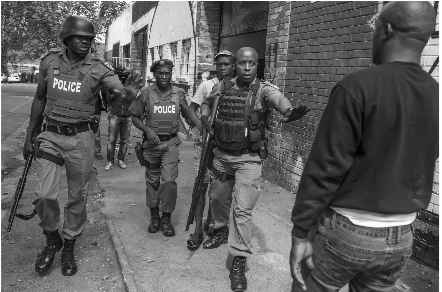
Armed members of the SAPS gesture to a Nigerian man to keep his distance to prevent him from approaching a South African Man who has been arrested while in the process of looting a Nigerian owned business in Jeppestown, Johannesburg. [Picture source: Ihsaan Haffejee – Al Jazeera]
Some campaigners are calling for the likes of the Zulu King to be hauled before the ICC. Others are calling for South Africa to be expelled from SADC and the African Union and leave it isolated as it was during the Apartheid era.
However, the truth is that it is not going to happen. There will be some posturing by ambassadors, presidents and politicians vying for political capital to brush up their bruised egos but nothing meaningful will come out of it until the next wave of attacks when all the posturing will be repeated again like a never-ending charade.
Reviews and inquests will be conducted but it will not make a difference. It is a part of the sham that is modern politics. Afterwards, announcements will be made that they have learnt their lessons and politicians will make empty promises again.
Politicians are going to attend meetings at the AU and SADC to discuss these matters over numerous courses of meals but the discussions at the conference table will serve us no purpose.
Tackling the root causes of xenophobic violence
However, the politicians will not address or tackle the root causes. It will not happen. Tackling the root causes will mean introspection and constructive change which is not something our African politicians are used to or willing to do.
Tackling the root causes of xenophobic violence means educating the people and tackling the high level of illiteracy, ignorance, poverty.
It means delivering on election pledges, transparency and honesty from those in government. It means structural changes to the socio-economic and political order. It means getting rid of corruption and bad governance.
No leader is willing to tackle these issues head on. African leaders, as a collective, all shy away from tackling these issues because they believe that they will threaten their survival.
Keeping the people divided and fighting each other and struggling to survive means the poor don’t have the luxury to think, and develop an awareness of why they are hungry and poor.
By keeping people hungry and fighting between themselves, politicians and the elite prevent the masses from thinking critically and turning against them.
It is at times like this we miss leaders like Steve Biko and his Black Consciousness Movement and philosophy. I can imagine Biko reminding the people that:
“The basic tenet of black consciousness is that the black man must reject all value systems that seek to make him a foreigner in the country [on the continent] of his birth and reduce his basic human dignity.”
The parenthesis above is mine. I believe Biko would find it difficult to believe that an African would be considered a foreigner on the continent of his or her birth; he would stand up and speak out against the reduction of the black man and woman’s dignity through xenophobia and the reckless utterances by those who yield power in society.
That no other leader after Biko has attempted to empower the people and decolonise their minds reinforces his idea that “the most powerful weapon in the hands of the oppressor is the mind of the oppressed”.
Politicians, like ticks, thrive on the blood of a mainly ignorant population. They can piss on them and tell them it is raining; their deaf, dead, dumb and blind followers will mobilise to convince the masses that the president said it is raining and so that is that.
Forget that the piss is warm and stinks. These ignoramuses in our midst will ignore the evidence in front of their eyes and demonise whoever thinks with their own mind and rejects the lie that it is raining. Those who reject the word will be accused of being unpatriotic or sell-outs; i.e. if they are not subjected to violence to silence their protestations.
Africa is facing a crisis of leadership as I wrote before and we need new leaders to take the continent in a different direction.
Is the influx of foreigners into South Africa a unique situation?
The influx of foreigners into South Africa is in no way a unique situation. It is a universal occurrence. Even countries without economies as strong or as diversified like South Africa such as Zambia, Malawi, Mozambique, Kenya, etc. are taking their share of economic and political refugees displaced within Africa.
But, there are no cries of xenophobia yet they also face dire economic circumstances and the same high levels of unemployment.
Yes, there are complaints of the Chinese immigrants coming into African countries and killing industries with cheap imports or taking over whole sectors of the economy or monopolising some mining sectors.
However, we are yet to see uprisings against the Chinese from other Africans across the continent as we witnessed in South Africa.
The xenophobic attacks we witnessed are unique to South Africa. The scale and barbarity of the acts eclipses anything we have probably ever seen.
We have witnessed politicians in the west using immigration as a means of manipulating the electorate using fear tactics.
Nigel Farage’s UKIP Party manipulated immigration in the run-up to the recent UK Elections to the extent of whipping out xenophobic fervour against immigrants, African and European.
Consequently, the Conservatives, Labour and others had to create a perception that they were tough on immigration to avoid being run over by the anti-immigrant electorate.
In this scenario, immigrants received the blame for lack of jobs, unemployment, losses to the NHS, etc.
The reality is that there are hundreds of thousands of teaching, nursing and IT jobs that are lying vacant because there aren’t qualified people who can fill those jobs.
It is a sham that slogans like British Jobs for the British are created and they resonate with the populace when in reality, there are hundreds of thousands of jobs British people can’t fill because they don’t have the necessary skills.
The truth is that they are going to recruit foreigners to fill those jobs because there is no other way around it. Politicians play dangerous games by creating such scenarios when the reality is very different from the perception.
This is not to insinuate that this only happens in the UK. No way. It happens in all the major countries in the west such as the US, Canada, etc.
So as stated above, the South African situation is not unique but they have dealt with it in a manner that we have not witnessed anywhere else in the world where people are experiencing the same problems.
Light at the end of the tunnel
Whenever there is a dark period, there is also light at the end of the tunnel. Forgive me when I say South Africans as if all South Africans are the same. I have stated above that “some” sectors of society are responsible for what happened.
There are probably larger pockets of society who are totally against what happened. They did not want this to be done in their name. They do not condone xenophobic violence of Afrophobia or whatever you call it.
We have also heard of various movements within the ghettoes that have been stepping up to the plate, patrolling their neighbourhoods to protect foreigners and their businesses.There are numerous initiatives started by South Africans both at home and in the Diaspora to say #NoToXenophobia.
There are a number of musicians, artists and politicians who have stood up and said No To Xenophobia.
Let us not forget all those good hearted South Africans who said enough is enough and took to the streets in protest, demanding an end to the violence and denouncing xenophobia.
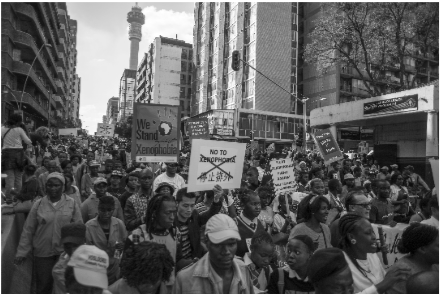
Anti-xenophobia protesters take to the streets of Johannesburg in thousands, holding up their placards and making sure their message is heard loudly and clearly.
[Picture source: Ihsaan Haffejee – Al Jazeera]
I say that the demon of xenophobia/ Afrophobia must be exorcised from the hearts and minds of the black man and woman. As they say in South Africa – Simunye – We Are One!
I believe in the words of Biko and his belief that, “In time, we shall be in a position to bestow on South Africa the greatest possible gift – a more human face”.
South Africa is not going to do that through xenophobia. It is going to do that by working together with her sisters and brothers in Africa and uplifting the human race.
We have a lot in common. We share a common heritage and it is our duty to uplift each other from the gutter as those who did it before us like Mwalimu Julius Nyerere, Kenneth Kaunda, Kwame Nkrumah, Samora Machel and others did to see a decolonised Africa.
We are not each others enemy. We want and need the same things. We want a greater slice of the economic cake that comes from the rich repositories of mineral wealth that ensues from our continent.
We want a better life for all: equal access to minerals, economical and political resources. We want an Africa free from violence, starvation and poverty.
Our greatest enemy today is corruption, ignorance and poor governance. They are doing more damage to Africa then anything else. It is the reason why our progress has been arrested. It is the reason why the socialism we fought died in the embryonic stages.
The spectre of neocolonialism and imperialism are on us: they are making off with our wealth while we are dying of thirst yet we are standing in water.
George Orwell, the famous writer, once wrote in the dystopian novel 1984 something to the effect that Africa was the continent that was passed over from one conqueror to another.
Reality is stranger than fiction; it seems like this fictitious work has some morsels of truth in it: we are becoming a continent that is fulfilling the words of Orwell as we are passed on from one hand of the conqueror to another.
Dear brothers and sisters, we must learn to love ourselves. We must love one another. Even the revolutionary is driven by enormous love.
It is important to have an enormous capacity of love to enable us to carry out the arduous and most difficult task of denouncing the cruel, and obscene assault against human beings who have the least in society when it is so much easier and comfortable to accommodate the power structure from which we can reap benefits for ourselves.
Our commitment must not yield to social injustice; we must give hope and hold firm to the conviction that an unfair and discriminatory world can be changed to be more just, less dehumanising and more humane. Change is difficult but it is not impossible. It is possible. We have numerous opportunities and possibilities to shake the structure of the world.
In the words of the great pedagogue, Paulo Freire, “I think that with a tranquil more alert and awakened consciousness, we should assume a position of indignation. I mean we should become indignant, but not at the favela dweller who kills, but indignant at the historical, political, social and economical situation that creates the possibility of me being killed by this unfortunate person”.
The root causes of the xenophobic violence doesn’t lie with the poor who have carried out that violence. On the contrary, the root causes that force migrants to flee their countries do not rest on the shoulders of the migrants.
Likewise, both are pawns in a greater struggle for power and control. It is a struggle shaped by historical, political, social and economical situations of which both are not always conscious of, or have an awareness of how they have shaped circumstances, but they view each other as enemies or competition.
Brothers and sisters, we all need the same basic things in life. All our countries are in the grip of the same forces. Therefore, we need each other to struggle against these forces that seek to use our African-ness as a mark of subservience.
Let us not be driven to desperate measures and remember that we are unofficial diplomats of Africa. As diplomats of the continent, we should work towards uplifting our motherland in all our endeavours.
Let us uplift one another from the slum and continue to strive for excellence in our chosen fields. Our focus should be on the kind of legacy that we are going to leave for our children and their descendants.
Are we going to keep up the stereotypes or are we going to break the chains? I believe we have the capacity to start a new chapter and continue where our respective revolutions left off and restore dignity and humanity to all Africans.
Oppression and poverty are dehumanising. It is our moral duty, our political duty to make Africa a less dehumanising place. Therefore, as unofficial ambassadors we must lead by example and be proud of our culture and remind the world of the beauty of our culture: that is our respect for life, private property and the likes as the picture by Steve Biko spells out below.
We are not each other’s enemy; we should be each other’s keeper. We have nothing to lose but our colonial chains. We have a land overflowing with milk and honey, gold and diamonds, cobalt and coltan, platinum and uranium and everything that the world desires. Africans from all over unite! We have a continent to win. Aluta Continua!
It is time to pause and reflect and realise that to reach our goals we need each other. No man or nation is an island. Our generation must do to our governments what our predecessors did to the colonial regimes if they refuse to change the political and socio-economical structures of Africa. Revolution is the only solution!
I leave you with the following words by Steve Biko, “Let us march forth with courage and determination, drawing strength from our common plight and our brotherhood”. Aluta Continua!


